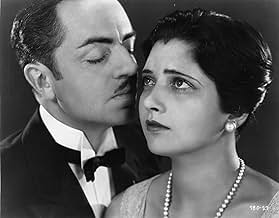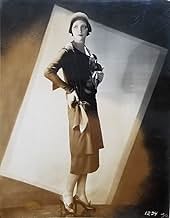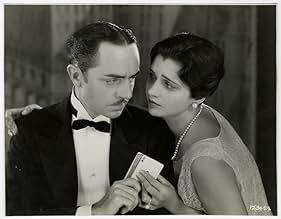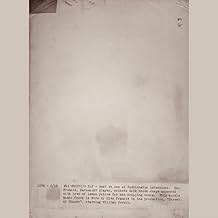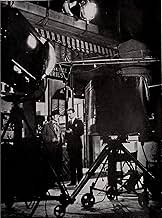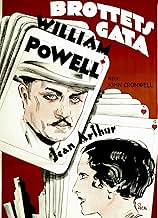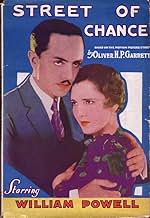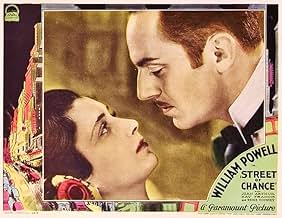Un gran jugador, pero honesto, tiene que evitar que su hermano menor siga sus pasos y se dedique al juego.Un gran jugador, pero honesto, tiene que evitar que su hermano menor siga sus pasos y se dedique al juego.Un gran jugador, pero honesto, tiene que evitar que su hermano menor siga sus pasos y se dedique al juego.
- Dirección
- Guionistas
- Elenco
- Nominado a 1 premio Óscar
- 3 premios ganados y 1 nominación en total
Oscar Apfel
- Bartender
- (sin créditos)
G. Pat Collins
- Police officer
- (sin créditos)
John Cromwell
- Imbrie
- (sin créditos)
Gordon De Main
- Gambler
- (sin créditos)
Jack Luden
- Holland House Hotel Clerk
- (sin créditos)
William H. O'Brien
- Waiter
- (sin créditos)
Broderick O'Farrell
- Gambler
- (sin créditos)
Opiniones destacadas
New York businessman William Powell (as John "Jack" B. Marsden) is really the city's notorious underworld gambler "Natural Davis" (modeled after the infamous Arnold Rothstein). While very successful at what he does (due to playing the percentages), Mr. Powell wants to get out of the racket. He has received a separation summons from model-ish posing Kay Francis (as Alma), who is tired of being the stay-at-home gambler's wife. Powell is also feeling some remorse about having a lowly compatriot (Brooks Benedict) shot dead. He prides himself on being honest, and will kill those who don't play by the rules. Nobody welches.
Powell promises Ms. Francis he will give up gambling, and they plan a second honeymoon.
Then, Powell's similarly gambling-addicted kid brother Regis Toomey (as Alan "Babe" Marsden) arrives from San Francisco. Newly married to Jean Arthur (as Judith), he is in New York to gamble Powell's cash wedding gift into bigger bucks - and he wants to do it in the company of the legendary "Natural Davis" (not knowing "Natural" is his brother). This is, of course, an eyebrow-raising plot development, since Mr. Toomey should probably be thinking he will lose his shirt in such a match-up - so, let's just call him overconfident. Well, Powell concocts a plan to quit gambling, re-gain his wife, and cure his brother's gambling itch...
"Street of Chance" is a typically spotty production for the times, but it does contain some great-looking moments, courtesy of director John Cromwell and photographer Charles Lang. Howard Estabrook received an "Academy Award" nomination for cleverly white-washing this story of a real life gambler; he uses natural dialogue - answering "Good morning" with "What's good about it?" And, quotes from popular songs (like "Button Up Your Overcoat)" certainly ticked some fancy. Powell is a commanding lead, and the incidental characters are colorful; as "Tony" the one-armed newspaper salesman, John Risso is most memorable.
******* Street of Chance (2/3/30) John Cromwell ~ William Powell, Kay Francis, Regis Toomey, Jean Arthur
Powell promises Ms. Francis he will give up gambling, and they plan a second honeymoon.
Then, Powell's similarly gambling-addicted kid brother Regis Toomey (as Alan "Babe" Marsden) arrives from San Francisco. Newly married to Jean Arthur (as Judith), he is in New York to gamble Powell's cash wedding gift into bigger bucks - and he wants to do it in the company of the legendary "Natural Davis" (not knowing "Natural" is his brother). This is, of course, an eyebrow-raising plot development, since Mr. Toomey should probably be thinking he will lose his shirt in such a match-up - so, let's just call him overconfident. Well, Powell concocts a plan to quit gambling, re-gain his wife, and cure his brother's gambling itch...
"Street of Chance" is a typically spotty production for the times, but it does contain some great-looking moments, courtesy of director John Cromwell and photographer Charles Lang. Howard Estabrook received an "Academy Award" nomination for cleverly white-washing this story of a real life gambler; he uses natural dialogue - answering "Good morning" with "What's good about it?" And, quotes from popular songs (like "Button Up Your Overcoat)" certainly ticked some fancy. Powell is a commanding lead, and the incidental characters are colorful; as "Tony" the one-armed newspaper salesman, John Risso is most memorable.
******* Street of Chance (2/3/30) John Cromwell ~ William Powell, Kay Francis, Regis Toomey, Jean Arthur
... with "The Czar of Broadway" being a different film made in the same year loosely based on the famous gambler's life.
John Marsden (William Powell) is a big time professional gambler who goes by the name "Natural Davis" when gambling. He has an office where he is supposed to be buying and selling bonds that acts as a front. John has a baby brother "Babe" (Regis Toomey) who lives on the west coast and who has very recently married Judith (Jean Arthur). They have come to New York City on their honeymoon. What Judith doesn't know is that Babe has run up John's wedding gift to them of ten thousand dollars to fifty thousand dollars by gambling and intends to continue gambling in New York to get the 150K that he needs to buy into the partnership of a firm. At the same time, John's wife Alma (Kay Francis) has served him with divorce papers after a six month separation, and she will not consider reconciling unless John retires as a professional gambler and leaves town with her.
John agrees to stop gambling and leave town with his wife, but shortly thereafter finds out that his brother is getting way in over his head gambling with the kinds of hoods who work along Broadway, and he's put in the position of either having to stop his brother and save him from the path he's been on all of these years, or have one last chance with his wife. Complications ensue.
William Powell played villains through 1928 at Paramount as his looks - if you knew nothing about his voice - allow him to look rather menacing. This was one of those films in which he was playing a bigger role than the types he had in the silent era, yet he is still playing a rather dark character. In spite of some of his more dastardly deeds, though, he is a relatable and even sympathetic protagonist.
I wish this film was better known, and I'd recommend this one. It has plenty of atmosphere - it's almost noirish in style and substance rather than a precode - and it is a good showcase for the talent of the main players, although Jean Arthur is almost unrecognizable here.
John Marsden (William Powell) is a big time professional gambler who goes by the name "Natural Davis" when gambling. He has an office where he is supposed to be buying and selling bonds that acts as a front. John has a baby brother "Babe" (Regis Toomey) who lives on the west coast and who has very recently married Judith (Jean Arthur). They have come to New York City on their honeymoon. What Judith doesn't know is that Babe has run up John's wedding gift to them of ten thousand dollars to fifty thousand dollars by gambling and intends to continue gambling in New York to get the 150K that he needs to buy into the partnership of a firm. At the same time, John's wife Alma (Kay Francis) has served him with divorce papers after a six month separation, and she will not consider reconciling unless John retires as a professional gambler and leaves town with her.
John agrees to stop gambling and leave town with his wife, but shortly thereafter finds out that his brother is getting way in over his head gambling with the kinds of hoods who work along Broadway, and he's put in the position of either having to stop his brother and save him from the path he's been on all of these years, or have one last chance with his wife. Complications ensue.
William Powell played villains through 1928 at Paramount as his looks - if you knew nothing about his voice - allow him to look rather menacing. This was one of those films in which he was playing a bigger role than the types he had in the silent era, yet he is still playing a rather dark character. In spite of some of his more dastardly deeds, though, he is a relatable and even sympathetic protagonist.
I wish this film was better known, and I'd recommend this one. It has plenty of atmosphere - it's almost noirish in style and substance rather than a precode - and it is a good showcase for the talent of the main players, although Jean Arthur is almost unrecognizable here.
'Natural' Davis (William Powell) is a respected gambler who follows a ruthless code of honour with those who cheat against him. His wife Alma (Kay Francis) wants to divorce him because of his addiction and lifestyle but they agree on a reconciliation and 2nd honeymoon together and 'Natural' promises to give up gambling. However, his plans change when his brother 'Babe' (Regis Toomey) arrives in town...............
This is a well acted film with William Powell very good in the lead role and Kay Francis a little irritating at times with her facial over-emoting. However, Powell carries the film and pulls it into the "good" category. It has a slightly downbeat ending.
This is a well acted film with William Powell very good in the lead role and Kay Francis a little irritating at times with her facial over-emoting. However, Powell carries the film and pulls it into the "good" category. It has a slightly downbeat ending.
William Powell is on the "Street of Chance" in this 1930 film also starring Kay Francis, Jean Arthur, and Regis Toomey.
I will admit right off that I did not recognize either Arthur or Toomey in this film.
Powell plays "Natural" Davis, a character modeled on the famed gambler Arnold Rothstein. The film portrays a couple of incidents in Rothstein's life, but in my opinion, the character is very loosely based on Rothstein.
Natural Davis is a professional gambler, and as a result, his wife Alma (Kay Francis) is divorcing him. He begs her to stay with him, eventually promising her that he will not only quit gambling, but go away with her on an extended trip..
When is brother Babe (Toomey) comes to town, Natural learns that his wedding gift of $10,000 has been spent gambling. Babe is a big winner and now has $50,000. He's in New York to gamble for $100,000 more so he can buy into a partnership.
Let me pause for a minute. The amounts of money these people are talking about are unbelievable. In 1930, $100,000 was 1,611,946.11 in today's money! Usually in films people are robbing banks for $5,000 or trying to get $50 from someone.
To continue - Natural does not want his brother to pursue the life of a gambler, so he's determined to make sure Babe is cleaned out. He arranges for his associates to help him, joining Babe in a game. It doesn't quite work out as he hoped. In a bind, he has to break his promise to Alma temporarily, but she doesn't buy it.
Powell is natural and very effective, and the film moves quickly, with people picking up their dialogue cues. Often in early talkies, actors were still adjusting to sound. As a result you get pauses between lines of dialogue, and, because of stage training, big gestures and loud voices. Powell has none of this. He's tough yet elegant and sympathetic yet ruthless.
Francis doesn't have much to do as Natural's suffering wife, but she's very good. The rest of the acting is fine, but you could have knocked me over with a feather when I learned that Babe was Regis Toomey and his wife was Jean Arthur! Arthur had none of the characteristics she later developed. Here, she's pure ingenue.
One of the most interesting things about these precode films is that because there is no Hayes code, the ending is not predictable as it is in many later films. The end of this kind of surprised me.
I will admit right off that I did not recognize either Arthur or Toomey in this film.
Powell plays "Natural" Davis, a character modeled on the famed gambler Arnold Rothstein. The film portrays a couple of incidents in Rothstein's life, but in my opinion, the character is very loosely based on Rothstein.
Natural Davis is a professional gambler, and as a result, his wife Alma (Kay Francis) is divorcing him. He begs her to stay with him, eventually promising her that he will not only quit gambling, but go away with her on an extended trip..
When is brother Babe (Toomey) comes to town, Natural learns that his wedding gift of $10,000 has been spent gambling. Babe is a big winner and now has $50,000. He's in New York to gamble for $100,000 more so he can buy into a partnership.
Let me pause for a minute. The amounts of money these people are talking about are unbelievable. In 1930, $100,000 was 1,611,946.11 in today's money! Usually in films people are robbing banks for $5,000 or trying to get $50 from someone.
To continue - Natural does not want his brother to pursue the life of a gambler, so he's determined to make sure Babe is cleaned out. He arranges for his associates to help him, joining Babe in a game. It doesn't quite work out as he hoped. In a bind, he has to break his promise to Alma temporarily, but she doesn't buy it.
Powell is natural and very effective, and the film moves quickly, with people picking up their dialogue cues. Often in early talkies, actors were still adjusting to sound. As a result you get pauses between lines of dialogue, and, because of stage training, big gestures and loud voices. Powell has none of this. He's tough yet elegant and sympathetic yet ruthless.
Francis doesn't have much to do as Natural's suffering wife, but she's very good. The rest of the acting is fine, but you could have knocked me over with a feather when I learned that Babe was Regis Toomey and his wife was Jean Arthur! Arthur had none of the characteristics she later developed. Here, she's pure ingenue.
One of the most interesting things about these precode films is that because there is no Hayes code, the ending is not predictable as it is in many later films. The end of this kind of surprised me.
Unlike a lot of very early talkies, this was made by a director for whom the introduction of sound didn't make him forget how to make films. It's clearly not as technologically advanced as pictures made just a year later but it's a remarkably professionally executed and well acted film.
Like the previous picture John Cromwell made for Selznick, THE DANCE OF LIFE, this also has none of those awful traits which blighted the very early talkies. It's dynamic, it's realistic and its dialogue feels natural. Scenes are allowed to develop and play out - there's none of that: switch the camera on - say the lines - switch the camera off technique common in say some Warner Brothers pictures where every foot of celluloid had to be accounted for. You're given the luxury to fully absorb what you're seeing - and indeed hearing. Such a pace could in a lesser movie result in a static, talky meandering malaise but fortunately this film's lively script and realistic characters keep your interest.
In an era of often simplistic stories, this is a surprisingly mature and intelligent offering. It's a serious and somber film about serious and somber issues but it successfully manages to distill all of that neatly into ninety minutes. Many years later Warners tackled the problem of gambling with its Edward G Robinson vehicle, DARK HAZARD. That had a much more light hearted approach which made it more accessible but although this isn't as enjoyable - you'll not smile much watching this - it's just as engrossing.
It's a real revelation to see William Powell not playing the usual debonair sophisticated cool guy. For a change, he's a somewhat damaged and unpleasant character but William Powell of course is just so likeable you're immediately on his side. The one loose wheel in this picture is, as is so often the case, Kay Francis. She was pretty good in a few films but her default affected acting style, gazing wistfully into the distance to speak her lines feels out of step with the rest of this film. I don't think she was quite ready for a lead part just yet in her career.
It's a good film, it's entertaining and it skilfully builds up the tension to an astonishing level towards the end but it's perhaps a film you appreciate more than you actually enjoy.
Like the previous picture John Cromwell made for Selznick, THE DANCE OF LIFE, this also has none of those awful traits which blighted the very early talkies. It's dynamic, it's realistic and its dialogue feels natural. Scenes are allowed to develop and play out - there's none of that: switch the camera on - say the lines - switch the camera off technique common in say some Warner Brothers pictures where every foot of celluloid had to be accounted for. You're given the luxury to fully absorb what you're seeing - and indeed hearing. Such a pace could in a lesser movie result in a static, talky meandering malaise but fortunately this film's lively script and realistic characters keep your interest.
In an era of often simplistic stories, this is a surprisingly mature and intelligent offering. It's a serious and somber film about serious and somber issues but it successfully manages to distill all of that neatly into ninety minutes. Many years later Warners tackled the problem of gambling with its Edward G Robinson vehicle, DARK HAZARD. That had a much more light hearted approach which made it more accessible but although this isn't as enjoyable - you'll not smile much watching this - it's just as engrossing.
It's a real revelation to see William Powell not playing the usual debonair sophisticated cool guy. For a change, he's a somewhat damaged and unpleasant character but William Powell of course is just so likeable you're immediately on his side. The one loose wheel in this picture is, as is so often the case, Kay Francis. She was pretty good in a few films but her default affected acting style, gazing wistfully into the distance to speak her lines feels out of step with the rest of this film. I don't think she was quite ready for a lead part just yet in her career.
It's a good film, it's entertaining and it skilfully builds up the tension to an astonishing level towards the end but it's perhaps a film you appreciate more than you actually enjoy.
¿Sabías que…?
- TriviaThe Alfred Hitchcock Hour (1962-1965) remade this story under the title of "A Piece of the Action" starring Gig Young and Robert Redford. It was the premier program of the show.
- ConexionesFeatured in David O. Selznick: 'Your New Producer' (1935)
Selecciones populares
Inicia sesión para calificar y agrega a la lista de videos para obtener recomendaciones personalizadas
- How long is Street of Chance?Con tecnología de Alexa
Detalles
- Fecha de lanzamiento
- País de origen
- Idioma
- También se conoce como
- Brottets gata
- Locaciones de filmación
- Productora
- Ver más créditos de la compañía en IMDbPro
- Tiempo de ejecución
- 1h 15min(75 min)
- Color
- Relación de aspecto
- 1.20 : 1
Contribuir a esta página
Sugiere una edición o agrega el contenido que falta

